
The Danse Macabre, also called the Dance of Death, is an artistic genre of allegory from the Late Middle Ages on the universality of death.

"Wilhelmus van Nassouwe", usually known just as "Wilhelmus", is the national anthem of both the Netherlands and its sovereign state, the Kingdom of the Netherlands. It dates back to at least 1572, making it the oldest national anthem in use today, provided that the latter is defined as consisting of both a melody and lyrics. Although "Wilhelmus" was not recognized as the official national anthem until 1932, it has always been popular with parts of the Dutch population and resurfaced on several occasions in the course of Dutch history before gaining its present status. It was also the anthem of the Netherlands Antilles from 1954 to 1964.
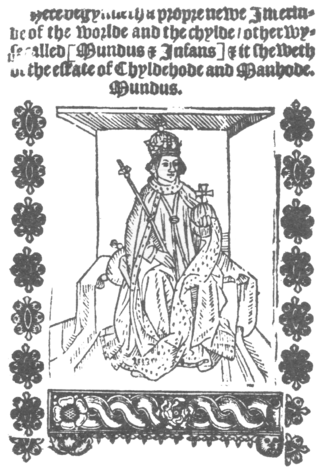
The morality play is a genre of medieval and early Tudor drama. The term is used by scholars of literary and dramatic history to refer to a genre of play texts from the fourteenth through sixteenth centuries that feature personified concepts alongside angels and demons, who are engaged in a struggle to persuade a protagonist who represents a generic human character toward either good or evil. The common story arc of these plays follows "the temptation, fall and redemption of the protagonist".
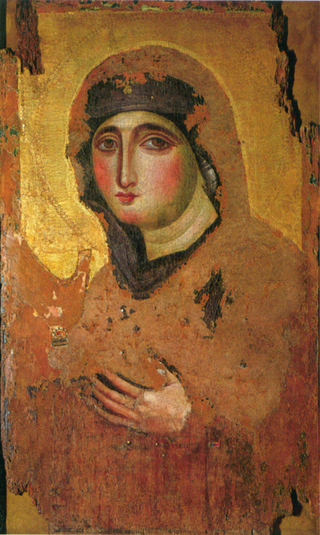
Mary was a first-century Jewish woman of Nazareth, the wife of Joseph and the mother of Jesus. She is a central figure of Christianity, venerated under various titles such as virgin or queen, many of them mentioned in the Litany of Loreto. The Eastern and Oriental Orthodox, Church of the East, Catholic, Anglican, and Lutheran churches believe that Mary, as mother of Jesus, is the Mother of God. Other Protestant views on Mary vary, with some holding her to have lesser status.
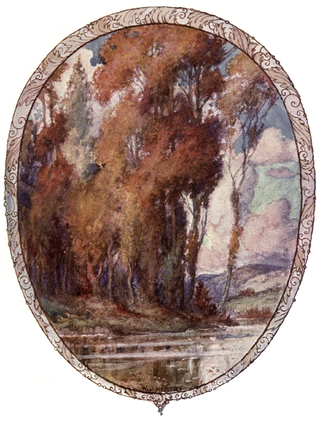
"To Autumn" is a poem by English Romantic poet John Keats. The work was composed on 19 September 1819 and published in 1820 in a volume of Keats's poetry that included Lamia and The Eve of St. Agnes. "To Autumn" is the final work in a group of poems known as Keats's "1819 odes". Although personal problems left him little time to devote to poetry in 1819, he composed "To Autumn" after a walk near Winchester one autumnal evening. The work marks the end of his poetic career, as he needed to earn money and could no longer devote himself to the lifestyle of a poet. A little over a year after the publication of "To Autumn", Keats died in Rome.
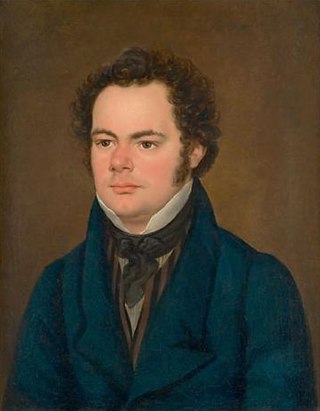
"Ellens dritter Gesang", in English: "Ellen's Third Song", was composed by Franz Schubert in 1825 as part of his Op. 52, a setting of seven songs from Walter Scott's 1810 popular narrative poem The Lady of the Lake, loosely translated into German.

Methodius of Olympus was an early Christian bishop, ecclesiastical author, and martyr. Today, he is honored as a saint and Church Father; the Catholic Church commemorates his feast on June 20.

This glossary of literary terms is a list of definitions of terms and concepts used in the discussion, classification, analysis, and criticism of all types of literature, such as poetry, novels, and picture books, as well as of grammar, syntax, and language techniques. For a more complete glossary of terms relating to poetry in particular, see Glossary of poetry terms.
"Dirty Hungarian Phrasebook" is a Monty Python sketch. It first aired in 1970 on Monty Python's Flying Circus as part of Episode 25, and also appears in the film And Now for Something Completely Different. Atlas Obscura has noted that it may have been inspired by English as She Is Spoke, a 19th-century Portuguese–English phrase book regarded as a classic source of unintentional humour, as the given English translations are generally completely incoherent.

Adam and Eve, according to the creation myth of the Abrahamic religions, were the first man and woman. They are central to the belief that humanity is in essence a single family, with everyone descended from a single pair of original ancestors. They also provide the basis for the doctrines of the fall of man and original sin, which are important beliefs in Christianity, although not held in Judaism or Islam.

"Tears, Idle Tears" is a lyric poem written in 1847 by Alfred, Lord Tennyson (1809–1892), the Victorian-era English poet. Published as one of the "songs" in his The Princess (1847), it is regarded for the quality of its lyrics. A Tennyson anthology describes the poem as "one of the most Virgilian of Tennyson's poems and perhaps his most famous lyric". Readers often overlook the poem's blank verse—the poem does not rhyme.
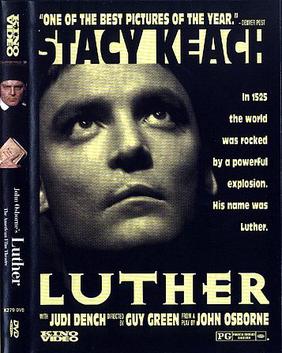
Luther is the 1974 American biographical drama film of John Osborne's biographical play, presenting the life of Martin Luther. It was one of eight in the first season of the American Film Theatre's series of plays made into films. It was produced by Ely Landau, directed by British director Guy Green, and filmed at Shepperton Studios, England. The film presents Martin Luther and his legacy for the world to evaluate. The young knight narrator is an "everyman" character who confronts Luther for advocating the suppression of the Peasants' Revolt of 1524–1526.
The Pilgrimage of the Soul or The Pylgremage of the Sowle was a late medieval work in English, combining prose and lyric verse, translated from Guillaume de Deguileville's Old French Le Pèlerinage de l'Âme. It circulated in manuscript in fifteenth-century England, and was among the works printed by William Caxton. One manuscript forms part of the Egerton Collection in the British Library.

Johann Sebastian Bach composed the church cantata Ich hatte viel Bekümmernis, BWV 21 in Weimar, possibly in 1713, partly even earlier. He used it in 1714 and later for the third Sunday after Trinity of the liturgical year. The work marks a transition between motet style on biblical and hymn text to operatic recitatives and arias on contemporary poetry. Bach catalogued the work as e per ogni tempo, indicating that due to its general theme, the cantata is suited for any occasion.

Soleares is one of the most basic forms or palos of Flamenco music, probably originating among the Calé Romani people of Cádiz or Seville in Andalusia, the most southern region of Spain. It is usually accompanied by one guitar only, in phrygian mode "por arriba" ; "Bulerías por soleá" is usually played "por medio". Soleares is sometimes called "mother of palos" although it is not the oldest one and not even related to every other palo

Sir Gowther is a relatively short Middle English tail-rhyme romance in twelve-line stanzas, found in two manuscripts, each dating to the mid- or late-fifteenth century. The poem tells a story that has been variously defined as a secular hagiography, a Breton lai and a romance, and perhaps "complies to a variety of possibilities." An adaptation of the story of Robert the Devil, the story follows the fortunes of Sir Gowther from birth to death, from his childhood as the son of a fiend, his wicked early life, through contrition and a penance imposed by the Pope involving him in a lowly and humiliating position in society, and to his eventual rise, via divine miracles, as a martial hero and ultimately to virtual canonization. But despite this saintly end, "like many other lays and romances, Sir Gowther derives much of its inspiration from a rich and vastly underappreciated folk tradition."
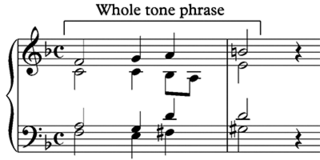
O Ewigkeit, du Donnerwort, BWV 60, is a church cantata for the 24th Sunday after Trinity composed by Johann Sebastian Bach. It was first performed in Leipzig on 7 November 1723, and is part of Bach's first cantata cycle. It is one of Bach's dialogue cantatas: its topic, fear of death and hope of salvation, plays out mainly through a conversation between two allegorical figures, Fear and Hope.

Sehet, wir gehn hinauf gen Jerusalem, BWV 159, is a church cantata by Johann Sebastian Bach. He composed it in Leipzig for the Sunday Estomihi, the last Sunday before Lent, and probably first performed it on 27 February 1729. The gospel reading for the Sunday, from the Gospel of Luke, includes Jesus announcing his suffering and death in Jerusalem. The cantata's theme and Bach's music foreshadow his Passion.

The New Eve is a devotional title for Mary, the mother of Jesus. Since the second century, numerous Eastern and Western Church fathers have expressed this doctrinal idea as an analogy to the biblical concept of the New Adam. Mary's unique and necessary participation in the economy of salvation is expressed in the doctrine, particularly her faith at the annunciation of the archangel Gabriel, which facilitates the incarnation of Jesus Christ and human redemption.
"Kol Meqadesh Shevi'i" is an ancient hymn, possibly composed by Moses ben Kalonymus. The hymn is first found in Add MS 27200, a 13th-century copy of the 11th-century Machzor Vitry, as the first hymn for the Sabbath; because the section with hymns does not appear in superior copies of Machzor Vitry, it is likely a later addition. Over the generations it has been set to many tunes. Ashkenazi Jews customarily sing it on Sabbath Eve, usually omitting the last stanza.
















